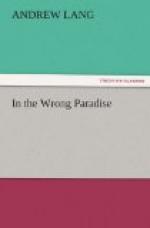This was all I could get out of the chaplain; indeed, there was no more to be got. I went to bed, but not to sleep. Next day, and many other days, I spent wrestling in argument with the Duchess. I brought her my certificate of baptism, my testamurs in Smalls and Greats, an old passport, a bill of Poole’s, anything I could think of to prove my identity. She was obdurate, and only said—“If you are not Percy, how do you know my secret?” I had in the meantime to alter the intended course of my novel—“The Baronet’s Wife.” The Baronet was made to become a reformed character. But in all those days at the lonely Towers, and in the intervals of arguing with the poor Duchess, I could not but meet Gwyneth Birkenhead. We met, not as cousins, for Miss Birkenhead had only too clearly appreciated the situation from the moment she first met me. The old seneschal, too, was in the secret; I don’t know what the rest of the menials thought. They were accustomed to the Duchess. But if Gwyneth and I did not meet as cousins, we met as light-hearted young people, in a queer situation, and in a strange, dismal old house.
We could not in the selfsame
mansion dwell
Without some stir
of heart, some malady;
We could not sit at meals but feel
how well
It soothed each
to be the other by.
Indeed I could not sit at meals without being gratefully reminded of Gwyneth’s advice about “taking some” on the night of my first arrival at the Towers.
These queer happy times ended.
One day a party of archaeologists came to visit the Towers. They were members of a “Society for Badgering the Proprietors of Old Houses,” and they had been lunching at Upton-on-the-Wold. After luncheon they invaded the Towers, personally conducted by Mr. Bulkin, a very learned historian. Bulkin had nearly plucked me in Modern History, and when I heard his voice afar off I arose and fled swiftly. Unluckily the Duchess chanced, by an unprecedented accident, to be in the library, a room which the family never used, and which was, therefore, exhibited to curious strangers. Into this library Bulkin precipitated himself, followed by his admirers, and began to lecture on the family portraits. Beginning with the Crusaders (painted by Lorenzo Credi) he soon got down to modern times. He took no notice of the Duchess, whom he believed to be a housekeeper; but, posting himself between the unfortunate lady and the door, gave a full account of the career of the late Duke. This was more than the Duchess (who knew all about the subject of the lecture) could stand; but Mr. Bulkin, referring her to his own Appendices, finished his address, and offered the Duchess half-a-crown as he led his troop to other victories. From this accident the Duchess never recovered. Her spirits, at no time high, sank to zero, and she soon passed peacefully away. She left a will in which her personal property (about 40,000 pounds a year)




